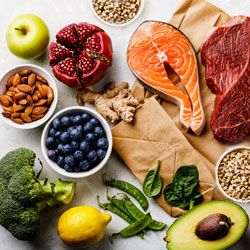A Spoonful of Superfood

We’ve all heard how important it is to eat a healthy diet. But not everyone realizes how the right foods can positively affect your health. According to Ann Hoffman, a clinical dietitian at Covenant HealthCare, “There are benefits in terms of helping to maintain a healthy weight, helping to prevent chronic illness, and helping you to feel well on a daily basis.”
Here are six great reasons to eat a healthy diet:
- Healthy eating helps prevent obesity. Excess weight is a risk factor for an array of chronic conditions, including Type 2 diabetes, high blood pressure, cardiovascular disease, and even some cancers. Women with excess weight also have an increased risk for complications during pregnancy. A healthy diet rich in fresh fruit and vegetables, whole grains and lean proteins is naturally lower in calories than one full of processed foods, sugar and refined carbohydrates.
- Healthy eating helps prevent heart disease and stroke. Choosing healthy fats over unhealthy ones can help lower LDL cholesterol (which is bad for the heart). In addition, vegetables and fruits provide phytonutrients that have been shown to provide protection from cardiovascular disease.
- Healthy eating may help prevent cancer. To avoid some cancers, “There’s a lot of research that supports eating more plant-based foods,” Ms. Hoffman says. And you should avoid foods have been linked to an increase in cancer risk, such as smoked, cured and processed meats.
- Healthy eating can help prevent or manage diabetes. A healthy diet will help you lose excess weight, which in turn makes it easier to manage your blood sugar.
- Healthy eating can improve your mood. A healthy diet will keep your blood sugar stable, which helps you avoid mood swings.
- Healthy eating can lead to a healthier lifestyle overall. With a healthy diet improving your mood and energy levels, you’re more likely to feel like getting some exercise, another important key to warding off chronic diseases as you age.
So what is a healthy diet, anyway?
To boost your energy, mood and protection against chronic disease, your diet should include:
Fresh vegetables and fruits. At least 5 servings daily; more is better. Dark green leafy vegetables are especially rich in nutrients, but remember to eat as many different colored vegetables as you can to get a full range of nutrients.
Whole grains. Choose whole wheat breads and pastas, brown rice and other whole grains like oats, barley, bulgur, and quinoa. White rice and white bread are highly processed, and the processing removes nutrients and fiber. White bread and rice also have a high glycemic index (they cause a spike in blood sugar).
Lean protein. The healthiest choices include seafood, poultry without skin, lean meats, beans, eggs and unsalted nuts and seeds. Oily fish like salmon and tuna provide Omega-3 fatty acids, which protect against heart disease. Lean red meat can be eaten occasionally but is a less healthy choice overall.
Healthy fats. Stick to monounsaturated and polyunsaturated fats, found in vegetable oils, seeds, nuts, whole grains and fish. Avoid trans fats completely—these raise the bad LDL cholesterol and stimulate inflammation. Saturated fats can be consumed in moderation (less than 8% of daily calories).
Water. Staying well-hydrated helps your kidneys rid your body of toxins, reduces your risk of kidney stones, and also helps prevent constipation. In addition, when you drink water instead of sugary beverages, it can help you maintain a healthy weight. Consumption of sugary beverages is linked to a number of chronic illnesses.
Posted Date: 1/22/2021